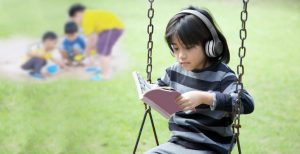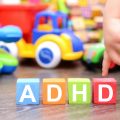 Watching children grow into their personalities is a fascinating process! Are they slow-to-warm-up to new people or places? Are they fearless risk-takers? Do they crave being the center of attention, or do they prefer quiet solo time?
Watching children grow into their personalities is a fascinating process! Are they slow-to-warm-up to new people or places? Are they fearless risk-takers? Do they crave being the center of attention, or do they prefer quiet solo time?
While there are so many things that parents and caregivers can influence and shape as children grow, things like their temperament and if they’re introverted or extroverted are innate characteristics that kids display from early childhood to adulthood.
Highlights:
|
Signs That Your Child May Be an Introvert
In her book, The Hidden Gifts of an Introverted Child, Dr. Marti Olsen Laney explains that temperament is hard-wired and signs of introversion or extroversion can appear as early as four months of age. As babies and toddlers grow and experience the world around them, specific personality traits become easier to detect.
Here are some signs that your child may be an introvert:
They’re very curious, but they always proceed with caution.
Introverts are natural observers. They love to ask deep questions, and they’re always craving to learn more about the world. They may be overly cautious, but their curiosity often pushes them to engage.
They’re anxious around new people or places.
Introverted children love routines and the comfort of knowing what happens next. They often become anxious or frustrated when exposed to unfamiliar situations, and they cling to caregivers until they feel safe exploring or socializing.
They take their time with responses.
Kids with strong signs of introversion are typically deep thinkers. They often pause when speaking because they want to choose the right words when expressing an idea or responding to a question. They also have a high sense of self-awareness, so it’s always worth it to be patient and wait to hear their thoughts!
They love solo quiet time.
Introverts are at peace in their solitude. They enjoy being creative in their alone time, and being creative is a way for them to express themselves without having to speak. They often gravitate to things like writing and art. Introverts also gain more energy from being alone, so you’ll typically see them at their best after their solo playtime.
They’re tired or cranky after playdates.
Just as they gain energy from being alone, they lose energy in highly stimulating group settings. Introverted kids feel irritable, tired, or overwhelmed after playdates or birthday parties. This doesn’t mean they don’t enjoy spending time with their peers! Introverts generally have great social skills, but they need time to decompress afterward.
They’re more expressive in comfortable and familiar environments.
When introverted children feel safe, comfortable, and are in familiar places, they can be just as uninhibited as their extroverted peers! You might notice your introverted child acting silly or craving attention when they’re at home in comparison to other places.
On-Demand Class – Introversion Uncovered: What is it and Why is it Important?
Living with an Introverted Child
It’s important for parents and caregivers to understand the natural hallmarks of introverts.
Research shows that almost 75% of the population is extroverted, and society tends to value their characteristics. Extroverts are the life of the party! It’s easy for them to make friends, they’re more expressive, and they can effortlessly manage new situations. Introverts, on the other hand, can use some extra patience and understanding, especially from caregivers.
Parents can help their introverted children by:
- Making sure they have a private space for solo time.
- Giving them time to recharge their batteries after socializing.
- Helping them recognize when they need to take a break.
- Celebrating their curiosity, introspection, and sensitivity.
- Gently encouraging them to explore outside their comfort zones when they feel self-assured and confident.
The most important thing for parents to know is that introverts have incredible attributes! Introverted kids are unique, deep-thinkers, compassionate, creative, and are often referred to as old souls. Accepting them for who they are is the first step towards helping them adapt and thrive in an extroverted world.
Back







